- Home
- William Gibson
Mona Lisa Overdrive
Mona Lisa Overdrive Read online
Mona turned a corner at random, automatic reflex avoiding a crazy, and found herself walking past sunfaded card tables spread with cheap Indo simstim sets, used cassettes, colored spikes of microsoft stuck in blocks of pale blue Styrofoam. There was a picture of Angie Mitchell taped up behind one of the tables, a poster Mona hadn’t seen before. She stopped and studied it hungrily, taking in the stars clothes and makeup first, then trying to figure out the background, where it had been shot. Unconsciously, she adjusted her expression to approximate Angie’s in the poster. Not a grin, exactly. A sort of half-grin, maybe a little sad. Mona felt a special way about Angie.…
MONA LISA OVERDRIVE
“Dust off those mirrored shades! The man credited with starting the cyberpunk movement is back with a new high-tech, far-future thriller.… Watching him mix together Japanese gangsters, Haitian voodoo, killer robots, and mean-spirited artificial intelligence is always compelling. He knows how to create quirky characters and propel them through expertly paced adventures. And, perhaps above all, he is a distinctive stylist whose prose has been polished until it gleams.”
—San Francisco Chronicle
“Gibson’s initial grab is his diamond-hard prose, stylish settings, and cinematic sweep.… But what sets him apart is his humanity: He creates characters who hurt, love, hate, and mourn like real people, even if they’re in a world where data is accessed by hallucinating ‘console jockeys’ and precious art is created by something in space that may be a machine and may be God.”
—The Seattle Times
“The man can write. His prose is sleek, hard, cool.”
—San Diego Tribune
“William Gibson showed that he has lost none of his brilliance with Mona Lisa Overdrive.”
—St. Louis Post-Dispatch Magazine
MONA LISA OVERDRIVE
“Gibson’s writing has gotten better—cleaner, quicker.… He has shaken up the fundamental principles of science fiction while sustaining it as a pop-culture genre by creating vivid characters and putting them into action-packed situations. The result is that instead of harboring a lot of wooden characters on distant planets floating around gabbing sententiously, Gibson’s novels contain the drive and intricate plotting of good adventure stories, while summoning up a world that bears just enough resemblance to our own to keep the reader rooted.”
—Philadelphia Inquirer
“There is not one story but five, each compelling, each displaying richness of character and subtlety of expression.… With a hint here, a word or two there, the stories converge, gather speed, and jump into cyberspace, literally and literarily.”
—Northwest Examiner
“A fascinating and gripping read.”
—The San Francisco Bay Guardian
“Smooth and liquid and quietly compelling.”
—Science Fiction Eye
“Gibson’s spare style contrasts wonderfully with his opaque plot and glinting, metallic settings; with his tale’s nebulous schemes of Yakuza overlords and the garish glory of a haircut called the Cleveland Fighting Fish.”
—Cleveland Plain Dealer
“Dazzling … Exceptional … A brilliant blender of high-tech speculation, intricate plotting, and sharply drawn characters.”
—St. Louis Post-Dispatch
“Gibson is simply a superb writer. This time the sheer inventiveness of phrasing that earned him unprecedented acclaim for his first novel, Neuromancer—the only book to simultaneously receive the Hugo, Nebula, and Philip K. Dick awards—is complemented by interior character portrayals that have made Mona more moving than its predecessor Count Zero.”
—Edmonton Magazine (Canada)
MONA LISA OVERDRIVE
A Bantam Spectra Book
PUBLISHING HISTORY
Bantam hardcover edition / November 1988
Bantam paperback edition / December 1989
SPECTRA and the portrayal of a boxed “s” are trademarks of Bantam
Books, a division of Random House, Inc.
All rights reserved.
Copyright © 1988 by William Gibson.
Library of Congress Catalog Card Number 88-14494.
No part of this book may be reproduced or transmitted in any form or by any means, electronic or mechanical, including photocopying, recording, or by any information storage and retrieval system, without permission in writing from the publisher. For information address: Bantam Books.
eISBN: 978-0-307-83119-4
Published simultaneously in the United States and Canada
Bantam Books are published by Bantam Books, a division of Random House, Inc. Its trademark, consisting of the words “Bantam Books” and the portrayal of a rooster, is Registered in U.S. Patent and Trademark Office and in other countries. Marca Registrada. Bantam Books, New York, New York.
v3.1_r1
Contents
Cover
Title Page
Copyright
Chapter 1. The Smoke
Chapter 2. Kid Afrika
Chapter 3. Malibu
Chapter 4. Squat
Chapter 5. Portobello
Chapter 6. Morning Light
Chapter 7. No There, There
Chapter 8. Texas Radio
Chapter 9. Underground
Chapter 10. The Shape
Chapter 11. Down on the Drag
Chapter 12. Antarctica Starts Here
Chapter 13. Catwalk
Chapter 14. Toys
Chapter 15. The Silver Walks
Chapter 16. Filament in Strata
Chapter 17. Jump City
Chapter 18. Jail-Time
Chapter 19. Under the Knife
Chapter 20. Hilton Swift
Chapter 21. The Aleph
Chapter 22. Ghosts and Empties
Chapter 23. Mirror Mirror
Chapter 24. In a Lonely Place
Chapter 25. Back East
Chapter 26. Kuromaku
Chapter 27. Bad Lady
Chapter 28. Company
Chapter 29. Winter Journey
Chapter 30. The Rip
Chapter 31. 3Jane
Chapter 32. Winter Journey (2)
Chapter 33. Star
Chapter 34. Margate Road
Chapter 35. The Factory War
Chapter 36. Soul-Catcher
Chapter 37. Cranes
Chapter 38. The Factory War
Chapter 39. Too Much
Chapter 40. Pink Satin
Chapter 41. Mr. Yanaka
Chapter 42. Factory Floor
Chapter 43. Judge
Chapter 44. Red Leather
Chapter 45. Smooth Stone Beyond
Dedication
About the Author
1
THE SMOKE
The ghost was her father’s parting gift, presented by a black-clad secretary in a departure lounge at Narita.
For the first two hours of the flight to London it lay forgotten in her purse, a smooth dark oblong, one side impressed with the ubiquitous Maas-Neotek logo, the other gently curved to fit the user’s palm.
She sat up very straight in her seat in the first-class cabin, her features composed in a small cold mask modeled after her dead mother’s most characteristic expression. The surrounding seats were empty; her father had purchased the space. She refused the meal the nervous steward offered. The vacant seats frightened him, evidence of her father’s wealth and power. The man hesitated, then bowed and withdrew. Very briefly, she allowed the mask her mother’s smile.
Ghosts, she thought later, somewhere over Germany, staring at the upholstery of the seat beside her. How well her father treated his ghosts.
There were ghosts beyond the window, too, ghosts in the stratosphere of Europe’s winter, par
tial images that began to form if she let her eyes drift out of focus. Her mother in Ueno Park, face fragile in September sunlight. “The cranes, Kumi! Look at the cranes!” And Kumiko looked across Shinobazu Pond and saw nothing, no cranes at all, only a few hopping black dots that surely were crows. The water was smooth as silk, the color of lead, and pale holograms flickered indistinctly above a distant line of archery stalls. But Kumiko would see the cranes later, many times, in dreams; they were origami, angular things folded from sheets of neon, bright stiff birds sailing the moonscape of her mother’s madness.…
Remembering her father, the black robe open across a tattooed storm of dragons, slumped behind the vast ebony field of his desk, his eyes flat and bright, like the eyes of a painted doll. “Your mother is dead. Do you understand?” And all around her the planes of shadow in his study, the angular darkness. His hand coming forward, into the lamp’s circle of light, unsteadily, to point at her, the robe’s cuff sliding back to reveal a golden Rolex and more dragons, their manes swirling into waves, pricked out strong and dark around his wrist, pointing. Pointing at her. “Do you understand?” She hadn’t answered, but had run instead, down to a secret place she knew, the warren of the smallest of the cleaning machines. They ticked around her all night, scanning her every few minutes with pink bursts of laser light, until her father came to find her, and, smelling of whiskey and Dunhill cigarettes, carried her to her room on the apartment’s third floor.
Remembering the weeks that followed, numb days spent most often in the black-suited company of one secretary or another, cautious men with automatic smiles and tightly furled umbrellas. One of these, the youngest and least cautious, had treated her, on a crowded Ginza sidewalk, in the shadow of the Hattori clock, to an impromptu kendo demonstration, weaving expertly between startled shop girls and wide-eyed tourists, the black umbrella blurring harmlessly through the art’s formal, ancient arcs. And Kumiko had smiled then, her own smile, breaking the funeral mask, and for this her guilt was driven instantly, more deeply and still more sharply, into that place in her heart where she knew her shame and her unworthiness. But most often the secretaries took her shopping, through one vast Ginza department store after another, and in and out of dozens of Shinjuku boutiques recommended by a blue plastic Michelin guide that spoke a stuffy tourist’s Japanese. She purchased only very ugly things, ugly and very expensive things, and the secretaries marched stolidly beside her, the glossy bags in their hard hands. Each afternoon, returning to her father’s apartment, the bags were deposited neatly in her bedroom, where they remained, unopened and untouched, until the maids removed them.
And in the seventh week, on the eve of her thirteenth birthday, it was arranged that Kumiko would go to London.
“You will be a guest in the house of my kobun,” her father said.
“But I do not wish to go,” she said, and showed him her mother’s smile.
“You must,” he said, and turned away. “There are difficulties,” he said to the shadowed study. “You will be in no danger, in London.”
“And when shall I return?”
But her father didn’t answer. She bowed and left his study, still wearing her mother’s smile.
The ghost woke to Kumiko’s touch as they began their descent into Heathrow. The fifty-first generation of Maas-Neotek biochips conjured up an indistinct figure on the seat beside her, a boy out of some faded hunting print, legs crossed casually in tan breeches and riding boots. “Hullo,” the ghost said.
Kumiko blinked, opened her hand. The boy flickered and was gone. She looked down at the smooth little unit in her palm and slowly closed her fingers.
“ ’Lo again,” he said. “Name’s Colin. Yours?”
She stared. His eyes were bright green smoke, his high forehead pale and smooth under an unruly dark forelock. She could see the seats across the aisle through the glint of his teeth. “If it’s a bit too spectral for you,” he said, with a grin, “we can up the rez.…” And he was there for an instant, uncomfortably sharp and real, the nap on the lapels of his dark coat vibrating with hallucinatory clarity. “Runs the battery down, though,” he said, and faded to his prior state. “Didn’t get your name.” The grin again.
“You aren’t real,” she said sternly.
He shrugged. “Needn’t speak out loud, miss. Fellow passengers might think you a bit odd, if you take my meaning Subvocal’s the way. I pick it all up through the skin.…” He uncrossed his legs and stretched, hands clasped behind his head. “Seatbelt, miss. I needn’t buckle up myself, of course, being, as you’ve pointed out, unreal.”
Kumiko frowned and tossed the unit into the ghost’s lap. He vanished. She fastened her seatbelt, glanced at the thing, hesitated, then picked it up again.
“First time in London, then?” he asked, swirling in from the periphery of her vision. She nodded in spite of herself. “You don’t mind flying? Doesn’t frighten you?”
She shook her head, feeling ridiculous.
“Never mind,” the ghost said. “I’ll look out for you. Heathrow in three minutes. Someone meeting you off the plane?”
“My father’s business associate,” she said in Japanese.
The ghost grinned. “Then you’ll be in good hands, I’m sure.” He winked. “Wouldn’t think I’m a linguist to look at me, would you?”
Kumiko closed her eyes and the ghost began to whisper to her, something about the archaeology of Heathrow, about the Neolithic and the Iron ages, pottery and tools.…
“Miss Yanaka? Kumiko Yanaka?” The Englishman towered above her, his gaijin bulk draped in elephantine folds of dark wool. Small dark eyes regarded her blandly through steel-rimmed glasses. His nose seemed to have been crushed nearly flat and never reset. His hair, what there was of it, had been shaved back to a gray stubble, and his black knit gloves were frayed and fingerless.
“My name, you see,” he said, as though this would immediately reassure her, “is Petal.”
Petal called the city Smoke.
Kumiko shivered on chill red leather; through the ancient Jaguar’s window she watched the snow spinning down to melt on the road Petal called M4. The late afternoon sky was colorless. He drove silently, efficiently, his lips pursed as though he were about to whistle. The traffic, to Tokyo eyes, was absurdly light. They accelerated past an unmanned Eurotrans freight vehicle, its blunt prow studded with sensors and banks of headlights. In spite of the Jaguar’s speed, Kumiko felt as if somehow she were standing still; London’s particles began to accrete around her. Walls of wet brick, arches of concrete, black-painted ironwork standing up in spears.
As she watched, the city began to define itself. Off the M4, while the Jaguar waited at intersections, she could glimpse faces through the snow, flushed gaijin faces above dark clothing, chins tucked down into scarves, women’s bootheels ticking through silver puddles. The rows of shops and houses reminded her of the gorgeously detailed accessories she’d seen displayed around a toy locomotive in the Osaka gallery of a dealer in European antiques.
This was nothing like Tokyo, where the past, all that remained of it, was nurtured with a nervous care. History there had become a quantity, a rare thing, parceled out by government and preserved by law and corporate funding. Here it seemed the very fabric of things, as if the city were a single growth of stone and brick, uncounted strata of message and meaning, age upon age, generated over the centuries to the dictates of some now-all-but-unreadable DNA of commerce and empire.
“Regret Swain couldn’t come out to meet you himself,” the man called Petal said. Kumiko had less trouble with his accent than with his manner of structuring sentences; she initially mistook the apology for a command. She considered accessing the ghost, then rejected the idea.
“Swain,” she ventured. “Mr. Swain is my host?”
Petal’s eyes found her in the mirror. “Roger Swain. Your father didn’t tell you?”
“No.”
“Ah.” He nodded. “Mr. Kanaka’s conscious of security in these matters,
it stands to reason.… Man of his stature, et cetera …” He sighed loudly. “Sorry about the heater. Garage was supposed to have that taken care of.…”
“Are you one of Mr. Swain’s secretaries?” Addressing the stubbled rolls of flesh above the collar of the thick dark coat.
“His secretary?” He seemed to consider the matter. “No,” he ventured finally, “I’m not that.” He swung them through a roundabout, past gleaming metallic awnings and the evening surge of pedestrians. “Have you eaten, then? Did they feed you on the flight?”
“I wasn’t hungry.” Conscious of her mother’s mask.
“Well, Swain’ll have something for you. Eats a lot of Jap food, Swain.” He made a strange little ticking sound with his tongue. He glanced back at her.
She looked past him, seeing the kiss of snowflakes, the obliterating sweep of the wipers.
Swain’s Notting Hill residence consisted of three interconnected Victorian townhouses situated somewhere in a snowy profusion of squares, crescents, and mews. Petal, with two of Kumiko’s suitcases in either hand, explained to her that number 17 was the front entrance for numbers 16 and 18 as well. “No use knocking there,” he said, gesturing clumsily with the heavy cases in his hand, indicating the glossy red paint and polished brass fittings of 16’s door. “Nothing behind it but twenty inches of ferroconcrete.”
She looked down the crescent, nearly identical facades receding along its shallow curve. The snow fell more thickly now, and the featureless sky was lit with a salmon glow of sodium lamps. The street was deserted, the snow fresh and unmarked. There was an alien edge to the cold air, a faint, pervasive hint of burning, of archaic fuels. Petal’s shoes left large, neatly defined prints. They were black suede oxfords with narrow toes and extremely thick corrugated soles of scarlet plastic. She followed in his tracks, beginning to shiver, up the gray steps to number 17.
“It’s me then,” he said to the black-painted door, “innit.” Then he sighed, set all four suitcases down in the snow, removed the fingerless glove from his right hand, and pressed his palm against a circle of bright steel set flush with one of the door panels. Kumiko thought she heard a faint whine, a gnat sound that rose in pitch until it vanished, and then the door vibrated with the muffled impact of magnetic bolts as they withdrew.

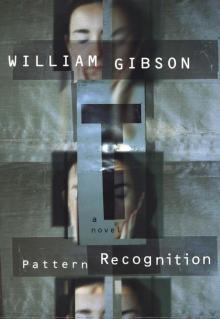 Pattern Recognition
Pattern Recognition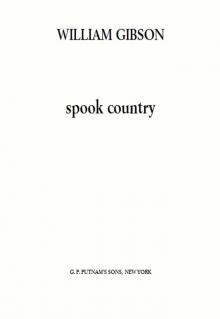 Spook Country
Spook Country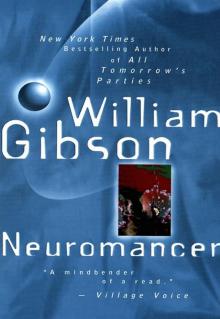 Neuromancer
Neuromancer Skinner's Room
Skinner's Room The Difference Engine
The Difference Engine Mona Lisa Overdrive
Mona Lisa Overdrive Zero History
Zero History The Peripheral
The Peripheral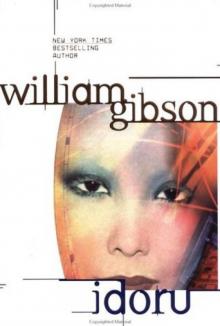 Idoru
Idoru Johnny Mnemonic
Johnny Mnemonic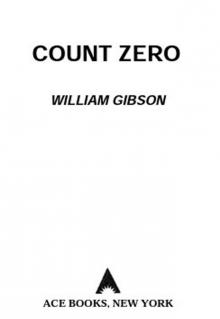 Count Zero
Count Zero Agency
Agency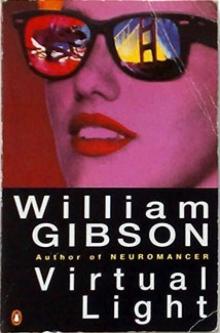 Virtual Light
Virtual Light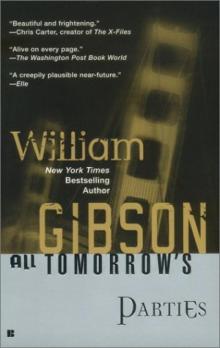 All Tomorrow's Parties
All Tomorrow's Parties The Miracle Worker
The Miracle Worker Disneyland with the Death Penalty
Disneyland with the Death Penalty Idoru tb-2
Idoru tb-2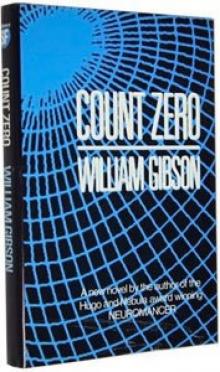 Count Zero s-2
Count Zero s-2 The Gernsback Continuum
The Gernsback Continuum New Rose hotel (tales)
New Rose hotel (tales)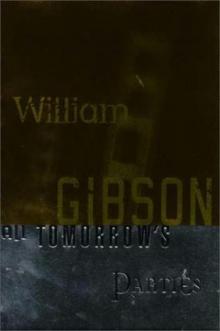 All Tomorrow's Parties bt-3
All Tomorrow's Parties bt-3 Hinterlands
Hinterlands Thirteen Views Of A Cardboard City
Thirteen Views Of A Cardboard City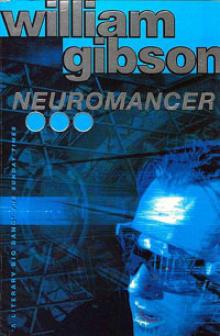 Neuromancer ts-1
Neuromancer ts-1 Virtual light b-1
Virtual light b-1